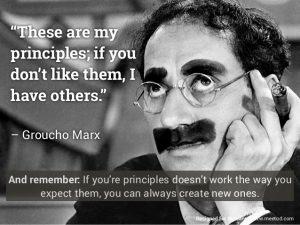I always remember this Alfred Hitchcock’s masterpiece while having to deal with an unpleasant situation from which I would rather stay away. His dolly zoom effect replicates perfectly the uncomfortable sensation that you experience when your stomach flinches and the subsequent spinning of the head begins.

The ingenious technique involves a camera pulling away from its subject as the lens zooms in, achieving a perspective distortion that imitates what is usually known as ‘vertigo’. In my personal case, suffering from acrophobia, I have become familiar with this disagreeable undermining of one’s self-possession to which, paradoxically, it is impossible to get accustomed. But it is even more difficult to tolerate when we find ourselves trapped in this kind of odd affairs which, if the worst comes to the worst, leaves us feeling at the edge of an abyss like in the famous movie.
In this brief post, I would like to raise consciousness about how perturbating is for young volunteers to bend, or even break, the ethical values that they have committed to respect in the name of an allegedly fairer ultimate goal. And certainly, if you are a fresh and enthusiastic volunteer trying to do your bit in a philanthropic organization, rather sooner than later, you will encounter the abyss…, and feel the vertigo of having to choose between sticking to the classical list of humanitarian principles or obediently doing what is best for the cause, regardless of your justified qualms.
Following Shana’s fascinating article about voluntourism in orphanages, I have come across some eye-opening stories of how volunteering overseas sometimes contributes to inculcating the wrong attitudes in these naïve fellows whose precious innocence is irremediably corrupted. Take the example of the cute orphan who is exhibited with the purpose of awakening the politicians’ sympathy, an outrageous story that mimics the tactics of the most despicable begging networks. More often than not, in this genre of movies, Groucho Marx’ role is brilliantly played by the person in charge, whose coaching responsibilities should respect the volunteer’s values instead of belittling their scruples and seeking their connivance with a more profitable approach for the organization.

But which are the consequences? Are we doing good or causing harm? And if yes, to whom? Both aid recipients and would-be humanitarian workers are equally victims of a broken promise, a delusion of pure and selfless brotherhood between volunteers and the community which will be sharply unmasked before the movie’s denouement. Needless to say, the damage is huge, far beyond any personal drama, taking into consideration that many of the volunteers are called to be the future of the aid sector and sadly enough, are bound to repeat the same mistakes. Maybe the seed is good, but without a proper stake, the tree will not grow straight.
Palpably, a good deal of vested economic interest is involved in the volunteering business. Actually, the industry has grown into a lucrative activity in which organized trip packages have matched the tourism sector profitability and, as a consequence, projects aimed at achieving the communities’ financial independence are not that attractive for the organizations, for fear of losing such money-making manna.
“Voluntourism has become and that it has entered the mainstream of holiday-makers, tour operators and the hotel business (Denskus 2011, Aidnography)”
As a matter of fact, money makes even the humanitarian world go around…

Therefore, should the volunteers-to-be desire to avoid the abyss and preserve their ethical principles, the evident measure will be to look into the company that they are intended to join and try to assess, first, whether there is a policy of respecting and maintaining local people‘s dignity, and second, whether the organization’s activities are conceived as means for eliminating dependency in a broad sense – technical, financial and political – and empowering the community towards long-term sustainable self-sufficiency (learn more here). By doing that, the volunteer ensures, to a certain extent, that the company is founded in sound moral principles.
However, if you still have second thoughts, watch this video before making your decision.
From a different perspective, I would like to highlight that ethical issues are always complex, and even more in the humanitarian sector, an industry where the main purpose should be to do good. As a result, the aid workers frequently find themselves in a quandary when having to decide between the lesser of two evils… What is more important, the volunteer’s moral integrity or community welfare? The answer is blurred as it is so difficult to make out where the boundaries are and what is really at stake when taking shortcuts. In order to facilitate a responsible answer, many organizations have established and adopted their ethical guidelines, and among them, the best known is the International Red Cross and Red Crescent Code of Conduct. However, many times those codes of moral values are more rhetoric than realistic, since they are impossible to be implemented and managed which, at the end of the day, might well foil the required action and have a negative impact on the humanitarian aid itself (see here).
To conclude, and back to the beginning of my post and the vertigo metaphor, the inexperienced volunteer will have to deal with tradeoffs that are just a preamble of major decisions to come, if they finally get a professional position in the industry. Consequently, and with regard to moral dilemmas, the volunteer will need to strike a balance and reconcile the different aspects involved in the management of the problem, and obviously, to find their own way along the cliff that delimits the ethical abyss.






